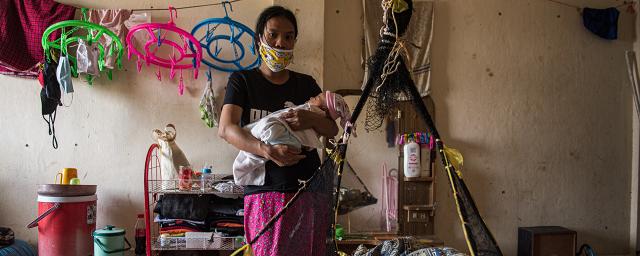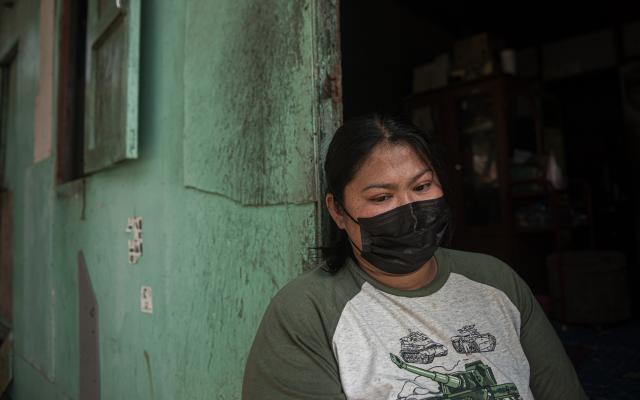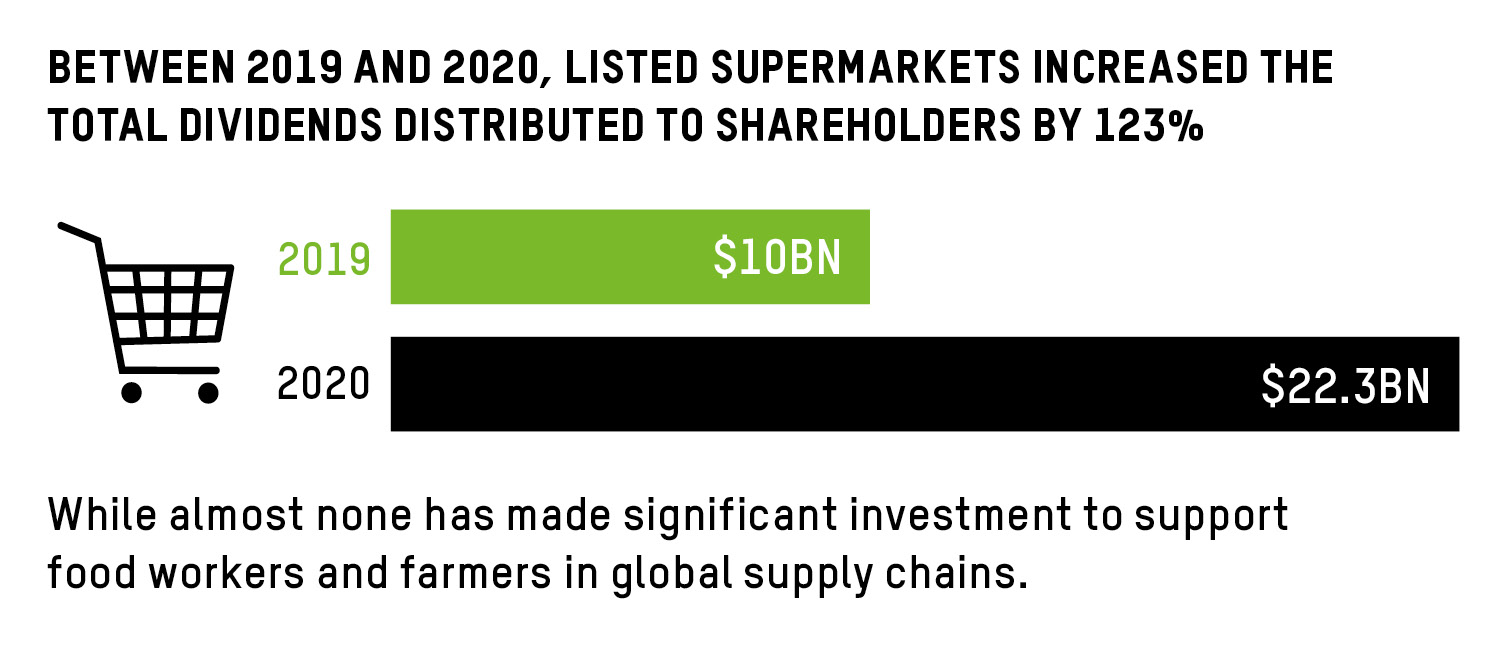
Nu, migrant worker in Thai shrimp industry. Photo: Patipat Janthong/Oxfam
Supermarkets driving growing inequality
Inequality is worsening and exploitation of women is endemic across the global economy. While inequality of power and value was already deeply unfair before the pandemic, it has now reached shocking proportions. COVID-19 has cost global workers $3.7 trillion in lost income, and women and young workers have been hardest hit, as they are often found in the most insecure and lowest-paid jobs. Few places reveal this trend more clearly than supermarket supply chains.
“COVID has hit us hard. This has resulted in us losing our jobs and lack of income.”

Photo: Patipat Janthong/Oxfam
In stark contrast to the escalating human misery brought by the pandemic, the supermarket sector has largely been the standout winner of the crisis. Senior executives, the largest institutional investors, and mostly wealthy shareholders of global supermarkets continue to be rewarded with ‘business-as-usual’ high compensation and dividends.
In fact, during the pandemic, publicly listed supermarkets distributed 98% of net profits to their shareholders via dividends and share buybacks. Meanwhile, workers and producers, especially women, across the globe – the people we call ‘essential’ or ‘frontline’ workers – have seen their incomes stagnate or even fall, while their rights continue to be violated.

Standout winners and huge payouts
Oxfam’s analysis of the global supermarkets ranked in its Supermarket Scorecard found that inequality is being exacerbated by COVID-19, with a huge human cost:
● Like-for-like food sales, excluding fuel, across listed retailers grew by 11.1% on average during the second to fourth quarter of 2020, up from just 1.6% sales growth from the same period in 2019.
● Non-listed retailers, such as Aldi North, Aldi South and Lidl, recorded an overall 8.5% increase in sales in 2020. Jumbo’s sales growth amounted to 11% for 2020 while PLUS Holding reported a 14% sales increase.
● The selected listed food retailers have seen share values skyrocket. Their market capitalization increased by $101bn (between March to December 2020), compared to an increase of $75bn in 2019.
● Between 2019 and 2020, total dividends distributed to shareholders increased by 123%, from about $10bn to $22.3bn.
● Owners of non-listed supermarkets, such as the Albrechts (owners of Aldi North and Aldi South) and Dieter Schwarz, owner of the Schwarz Group (consisting of Lidl and Kaufland), have seen their wealth increase by 37% and 30%,respectively, in less than a year.

Costs related to COVID-19 reported by the supermarkets pale in comparison to their additional revenues gained and increased shareholder payouts during the pandemic. Few have taken the opportunity to invest in longer-term supply chain improvements to benefit the food producers and workers experiencing extreme hardship due to the pandemic.
“We need to send remittances to our children every month. It makes me feel heavy-hearted since I have nothing to send them.”

Photo: Patipat Janthong/Oxfam
Women hit the hardest
Exploitation, gender discrimination and inequality in global food supply chains have been widely documented but remain largely unaddressed by supermarkets.

Oxfam’s new research highlights critical issues that supermarkets must address:
Violation of workers’ rights is evident across multiple food supply chains in different regions
Between November 2020 and February 2021 Oxfam conducted new research on working conditions in the production of coffee in Brazil, basmati rice in Pakistan and wine in South Africa, and updated earlier research on Assam tea production in India and seafood production in Thailand. Most workers and farmers interviewed by Oxfam and partners do not earn a living income or wage, and some do not even earn a monthly minimum wage. In Brazilian coffee production, slavery-like working conditions reported on Brazil’s official Dirty List to combat slavery could be linked to many supermarkets’ supply chains.

“My children were afraid of being killed if they tried to leave.”

Photo: Tatiana Cardeal/Oxfam
Extractive business model
New research shows that the unfair distribution of value across supermarkets’ high-risk supply chains persists.



Women’s rights violations in supermarket supply chains are pervasive and systemic.
COVID-19 has exacerbated existing structural gender inequalities and made the situation even more dire for women workers and farmers. Oxfam’s research reveals evidence that women workers – who were already earning less – have lost more income than men during the pandemic. Women workers have effectively acted as shock absorbers during the pandemic and will end up worse off, while at the other end of the supply chain, companies and shareholders have continued to prosper.

Until now, supermarkets have failed to take adequate action to address the abuse of labour rights experienced by women in supply chains. Transparency is greatly lacking: of the retailers featuring in Oxfam’s global Supermarket Scorecard, only Tesco has published a gender policy, detailing the actions it will take to improve the position of women in four high-risk supply chains. None of the supermarkets are tracking and disclosing gender-disaggregated data.

Supermarkets at a crossroads
Oxfam believes that supermarkets are at a crossroads, where they can choose to change their core business model to distribute more power and value to women in their supply chains.
We propose that supermarkets take the following actions:
| 1 |
Urgently revisit relevant policies and practices to factor in the risks to workers and small-scale farmers from COVID-19 and the impact on their job and income security; supermarkets should show how their plans have been updated to reflect the specific needs of women workers in their supply chains. |
| 2 |
Promptly address actual and potential human rights violations and respect workers’ rights, including by committing to achieving living wages in supply chains. |
| 3 |
Urgently adopt a comprehensive gender policy and action plan to ensure that women’s rights are respected, in supermarkets’ own operations and supply chains. |
| 4 |
Shift corporate practice on maximizing shareholder payouts and redirect spending towards long-term supply chain investment that ensures fair and decent working conditions for workers, farmers and women in their supply chains. |
Governments also need to act. They must repeal laws that discriminate against women, promote laws to guarantee a living wage for workers, adopt mandatory human rights due diligence (HRDD) legislation and put a stop to excessive shareholder payouts.
Help us reveal what’s behind the price of the food we buy
Human suffering should never be an ingredient in the food we eat. You can use your influence to campaign for real change and help us challenge those in power to make sure small-scale farmers, fishers and workers who produce our food are being treated and paid fairly.